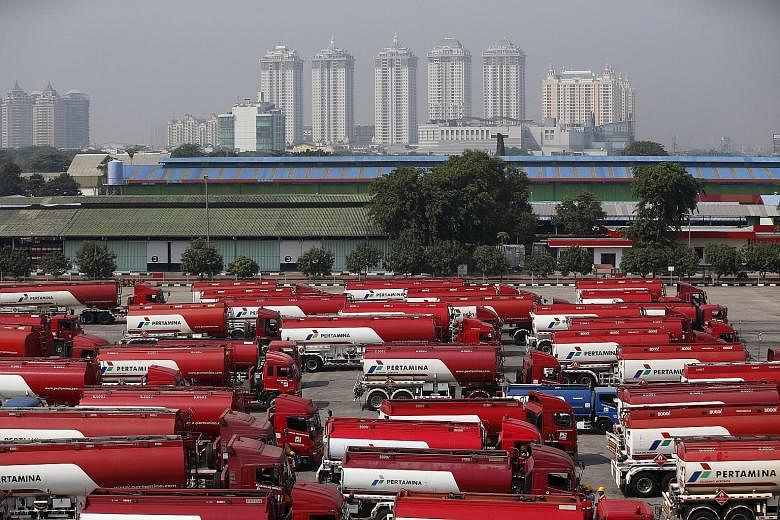LONDON • Brent crude oil extended a slide yesterday to its lowest level in more than 11 years amid speculation suppliers from the Middle East to the United States will exacerbate a glut as they fight for market share.
Brent for February settlement slid as much as 83 cents to US$36.05 a barrel on the ICE Futures Europe exchange, the lowest level in intraday trade since July 2, 2004.
Prices are down 36 per cent this year, set for a third annual loss.
"What is pushing the price lower is nothing new.
"It's all about the same ingredients: oversupply and weak consumption,"said Mr Naeem Islam, chief market analyst at Avatrade.
Crude's persistent weakness has exerted heavy downward pressure on oil-exporting countries' currencies, foreign exchange reserves and government budgets.
The latest to feel the heat was Azerbaijan, which yesterday floated its currency, the manat. The currency plunged 32 per cent to 1.55 per US dollar.
Oil has collapsed below levels last seen during the 2008 global financial crisis on signs the market's oversupply will worsen.
That has boosted markets in swathes of the developing world, especially Asia, taking MSCI's emerging equity index 0.3 per cent higher. Bourses in Seoul, Mumbai and Taipei rallied, and China's markets closed 1.8 to 2.0 per cent higher while most regional currencies were lifted by a higher central bank fixing for the yuan.
The Organisation of the Petroleum Exporting Countries (Opec) effectively abandoned output limits at a Dec 4 meeting, while the US on Friday passed legislation that lifted a 40-year ban on crude exports.
"Excess supply to the tune of 1.3 million barrels per day, and Opec's divide will keep prices depressed in the near term," said Mr Giovanni Staunovo, an analyst at UBS AG in Switzerland. "That said, supply adjustments are already under way. Non-Opec production growth slowed almost to a standstill, and should decline next year."
Meanwhile, Indonesia said yesterday it will let private investors build oil refineries in a regulation to be issued "in days", its chief economics minister said.
The move will be the latest in a series seeking to restore investment confidence and revive growth in South-east Asia's largest economy.
In recent months, the government has announced measures including tax breaks and lower energy prices to try to stimulate growth, this year at its slowest pace since 2009.
"All this time, refinery projects are always given to Pertamina or to Pertamina and its partners," coordinating minister for economics Darmin Nasution told a press conference, referring to the state energy company. "In the future, we will open it for private investors, although the refined products must be sold to Pertamina to be distributed to the whole of Indonesia."
Mr Nasution said as part of the measures to take effect next month, Indonesia will bundle a refinery project with a petrochemical plant to make it more commercially viable.
Investors interested to build oil refineries may ask for tax or non-tax incentives and the government will consider the requests, he added.
REUTERS, BLOOMBERG

